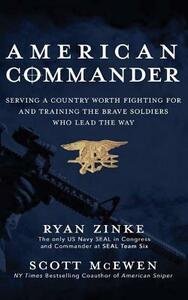Take a photo of a barcode or cover
Zinke's autobiography reads as though in conversation with the reader. He is able to intermingle stories of growing up in Montana, playing football, and being a SEAL with politics. Not an easy task. I was entertained by his childhood exploits and amazed at his adult insights gleaned from years of experience with the teams. I thought he did a good job covering the broad strokes without giving confidential information and only providing knowledge that was readily accessible to the public. For some who don't follow politics or the military, the book will provide a good lesson on SEAL history. I'm glad he's on our side.
This is a book with much potential, but, sadly, it fails to deliver.
The book takes several detours, derailing the narrative flow and distracting from stories of growing up in Montana and serving in the SEALs that COULD be both fascinating and compelling. It seems as if the coauthor was intent on letting Zinke's voice come through, and while that's admirable, the end effect comes off more as verbal story telling from someone who couldn't stay on topic. Some more proactive editing would have helped the flow of almost every story in the book - plus, it would have caught some of the more aggravating typos (I've never once heard of ANY Special Forces community referred to as "quite professionals," as the book says at one point; the word they're looking for is "quiet").
Moreover, many of these narrative detours take the form of political proselytizing. It was written at a time when Zinke was a freshman representative, and his periodic diatribes seem meant to burnish his conservative credentials. All of this serves to make the book read less like a military memoir and more like a manifesto. Admittedly, it worked - to a point: he did manage to secure a cabinet post in the Trump Administration (though he could not hold it, resigning amid ethics investigations).
Readers who share his political views and philosophy probably won't mind the substance of his tangents, but I'd have to think they'd still find it distracting to the point of, at times, making the vignettes he's ostensibly trying to relay difficult to follow.
Readers who DON'T happen to share his political views will find all this not just distracting, but at times downright aggravating to the point of alienation. That is the true tragedy of the book's unrealized potential - the stories the author could tell of life as a SEAL deserve to be told without the baggage of political polemics.
I won't tell someone not to read it, but potential readers need to know what they're getting into. This isn't so much a military memoir as it is a somewhat poorly organized political manifesto wrapped in the trappings of early 21st century America's penchant for fetishizing military service.
The book takes several detours, derailing the narrative flow and distracting from stories of growing up in Montana and serving in the SEALs that COULD be both fascinating and compelling. It seems as if the coauthor was intent on letting Zinke's voice come through, and while that's admirable, the end effect comes off more as verbal story telling from someone who couldn't stay on topic. Some more proactive editing would have helped the flow of almost every story in the book - plus, it would have caught some of the more aggravating typos (I've never once heard of ANY Special Forces community referred to as "quite professionals," as the book says at one point; the word they're looking for is "quiet").
Moreover, many of these narrative detours take the form of political proselytizing. It was written at a time when Zinke was a freshman representative, and his periodic diatribes seem meant to burnish his conservative credentials. All of this serves to make the book read less like a military memoir and more like a manifesto. Admittedly, it worked - to a point: he did manage to secure a cabinet post in the Trump Administration (though he could not hold it, resigning amid ethics investigations).
Readers who share his political views and philosophy probably won't mind the substance of his tangents, but I'd have to think they'd still find it distracting to the point of, at times, making the vignettes he's ostensibly trying to relay difficult to follow.
Readers who DON'T happen to share his political views will find all this not just distracting, but at times downright aggravating to the point of alienation. That is the true tragedy of the book's unrealized potential - the stories the author could tell of life as a SEAL deserve to be told without the baggage of political polemics.
I won't tell someone not to read it, but potential readers need to know what they're getting into. This isn't so much a military memoir as it is a somewhat poorly organized political manifesto wrapped in the trappings of early 21st century America's penchant for fetishizing military service.

